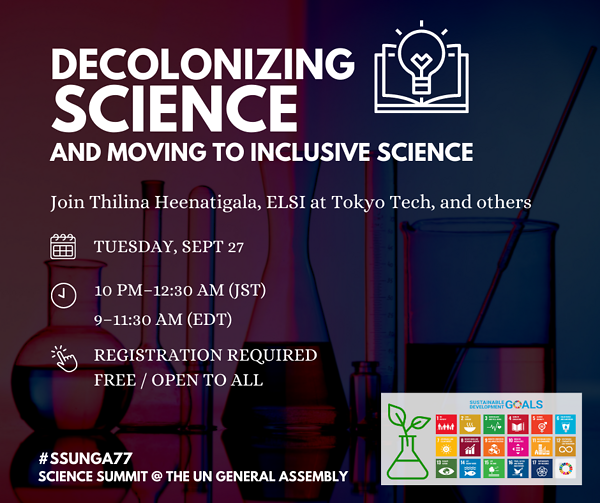Decolonizing Science and Moving to Inclusive Science

Date
Location
Description
Please Register by clicking HERE
Colonial scientific practices are embedded in current scientific research, policy, education, and outreach. It is therefore necessary to acknowledge and undo colonial structures and processes and change practices and mindsets within science and scientific communities. A keynote presentation and subsequent panel will address colonial scientific practices, the negative scientific developments that are caused by them, and how to move towards an inclusive science system, globally.
Colonial scientific practices can be found at multiple levels in science systems. For example, large scientific structures are built in indigenous lands without ethical policy discussions, there are large discrepancies between local and international salaries for the same research positions, and end-users of data that are produced by structures in the Global South are found mostly in the Global North. In general, academia is still largely based on 17th century European social structures.
The effects of colonial efforts that exist around the world were somewhat highlighted during the COVID-19 pandemic. When scientists from the Global North and western world struggled with travelling for field work, the system had to rely on local expertise for collaborations. This was visible far beyond the sciences and goes into other fields as well, showing that colonial practices are still at work today. There is an urgent need to redesign the system in order to advance the sciences in an inclusive way.
These are local and global issues that are urgent and need to be addresses today. By acknowledging, addressing the issues, making awareness, and finally undoing the colonial structure from science system is the way towards an inclusive science environment. Progressing from colonial science to inclusive science is at global interest for better industry and innovation practices, reducing inequalities in science academia and education, improving the core curriculum by including incorporating native and local knowledge for higher-quality education.
Moderator
Thilina Heenatigala
Speakers
Asha de Vos
Tana Joseph
Website URL
Subscribe to the OIST Calendar: Right-click to download, then open in your calendar application.



